CELEBRATING YOUR IMPACT
Recognising the positive influence you have on your pupils


IN THE CLASSROOM • PROFESSIONAL LEARNING • PUPIL SUPPORT • AFTER HOURS SPRING / SUMMER 2023 www.teachersresource.co.uk
Inspiration to help you prepare for the holidays PLANNING FOR SUMMER Highlighting the impact of the workload crisis ACTION ON WORKLOAD












Share your views with SQA Sign up to our pulse survey panel for practitioners to help us understand what issues are important to you. Visit www.sqa.org.uk/pulsesurveys
PUBLISHER
Denise Connelly denise@dcpublishing.co.uk
EDITOR
Emma Storr emma.storr@dcpublishing.co.uk
DESIGN AND PRODUCTION
Lucy Baillie lucy.baillie@dcpublishing.co.uk
SALES
Marian Mathieson marian.mathieson@dcpublishing.co.uk
Spring / Summer 2023
The countdown to the summer holidays is o cially on, and while we’re sure you can’t wait to relax and de-stress in the sun, your pupils have something else on their minds: exams season. You can find a breakdown of useful dates on page 10, and on page 12, find tips on supporting pupils who are studying ahead of their exams.
During this time, the continued pressure put on teachers to do more cannot be ignored. On page 6 we’re discussing the workload crisis and why it is key that measures are put in place before this gets worse, and on page 24 we’re highlighting the importance of looking after your mental health and wellbeing, and sharing some tips on how to start.
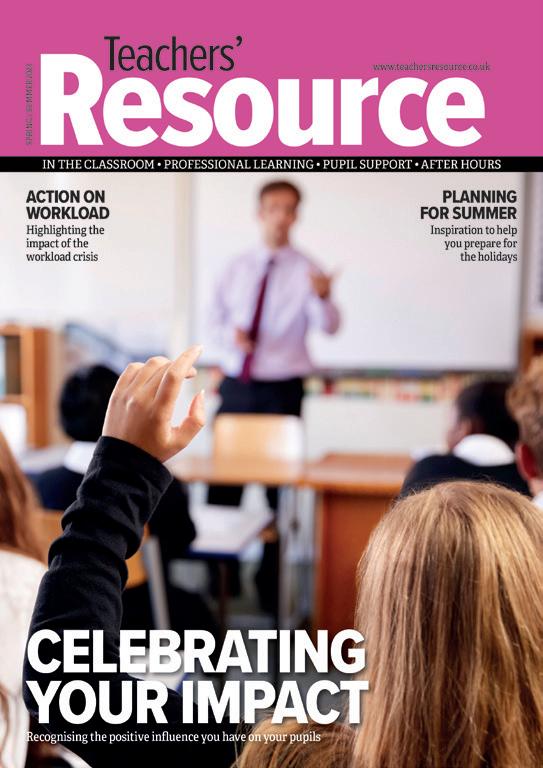
Having a healthy work-life balance is key, that’s why we’re sharing our best summer holiday ideas on page 28, helping you get in control of your money on page 26, and o ering ways to unwind on page 30. All of this and much more inside!

Emma
Emma Storr, Editor

What’s Inside
Pupil support
10 DATES FOR YOUR DIARY
Support pupils with this helpful calendar.
12 SUPPORTING STUDENT STUDY
Help pupils as they approach exams season.
In the classroom
6 ACTION ON WORKLOAD
The challenge putting extreme pressure on teachers.
14 CELEBRATING YOUR IMPACT
28
DC Publishing Ltd, 198 Bath Street, Glasgow, G2 4HG Tel: 0844 249 9007
©DC Publishing Ltd 2023. All rights reserved. No part of this publication may be reproduced or used in any way without prior wri en permission from the publisher. The views expressed in this magazine are not necessarily those of DC Publishing Ltd. The publisher takes no responsibility for claims made by advertisers within the publication. Every effort has been made to ensure that information is accurate; while dates and prices are correct at time of going to print, DC Publishing Ltd takes no responsibility for omissions and errors.
www.teachersresource.co.uk
ResourceMagScot
Acknowledging the influence you can have on young people’s lives.
17 FOCUS ON: PUPIL BEHAVIOUR
Creating a safe environment to address behavioural issues.
Professional development
4 INDUSTRY NEWS

The latest updates a ecting education.
8 CONTINUED LEARNING
Advance your skills in the classroom with a CPD course.
After hours
21 TIME TO GIVE BACK
Could you spend time volunteering this summer?
24 BEING MINDFUL OF YOUR MENTAL HEALTH
Supporting your mental health and wellbeing to help you thrive.
26 YOUR MONEY MANAGEMENT
Get in control of your finances using helpful tips.
28 PREPARING FOR SUMMER
The summer holidays are almost here, it’s time to get inspired.
30 EMBRACING WELLBEING
Make the most of the longer days and try something new.
Showcase
18 A LITTLE SUPPORT FOR A BIG DIFFERENCE
A scheme funding school’s small projects.
www.teachersresource.co.uk 3
DC Publishing Ltd 198 Bath Street, Glasgow, G2 4HG Tel: 0844 249 9007
Editor’s Letter
INDUSTRY NEWS
TEACHER PAY DEAL COMES INTO PLAY
SCHOOLS PRAISED FOR
APPROACH
TO
BUT CALLS REMAIN FOR GREATER REPORTING
BULLYING,
In a report from Education Scotland looking at how bullying is reported and monitored across primary, secondary and special schools in Scotland, schools were praised for openly acknowledging, discussing and challenging bullying as unacceptable behaviour. While the report celebrated this commitment to creating safe and secure environments for young people, it also made recommendations to improve recording and monitoring of incidents. This included the need to have a whole-school process in place for monitoring incidents of bullying; for schools to work in partnership with parents, learners and staff to agree a shared definition of bullying; and regularly recording incidents accurately in order to identify the scope of bullying across the whole school.
At the beginning of this month (April 2023), the second increase of a three-part pay deal around teacher salaries came into effect, signifying a five per cent increase at all SNCT pay points. This follows on from a backdated seven per cent increase at all SNCT pay points with effect from 1 April 2022. The third part of the rise covering the period of 1 April 2022
to 31 July 2023 will come into effect from 1 April 2024, with a further increase of two per cent at all SNCT pay points. Overall, the 28-month offer equates to a 14.6 per cent cumulative increase in salary. For those who are already earning £80,000 or above and are subject to cap paired with flatrate rises, the three rises equate to a monetary value of £11,200.

Research finds reduced subject choices affecting outcomes for young people
New research from the University of Stirling has revealed that curriculum narrowing and a reduced choice of school subjects under the Curriculum for Excellence is affecting outcomes for young people in Scotland. The research, considered to be the most comprehensive study of Scottish secondary schools’ curriculum provision, was completed over three years and funded by the Nuffield Foundation. It found inequalities in outcomes for young people, with those in more deprived areas affected
the most. Surveys, interviews and focus groups involving school leaders, local authorities, teachers, young people and parents were used for the analysis. It was revealed that S4 students were studying fewer subjects than before the curriculum was introduced, clashing with its aim of broadening the secondary school curriculum. Young people attending schools in more deprived areas were also more likely to postpone studying for National 5 qualifications until S5 and for Highers until S6.
www.teachersresource.co.uk 4
NEWS
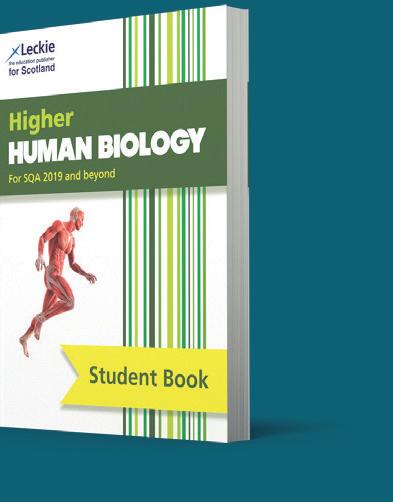
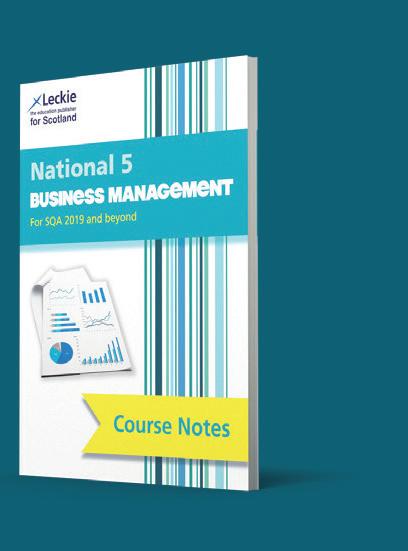

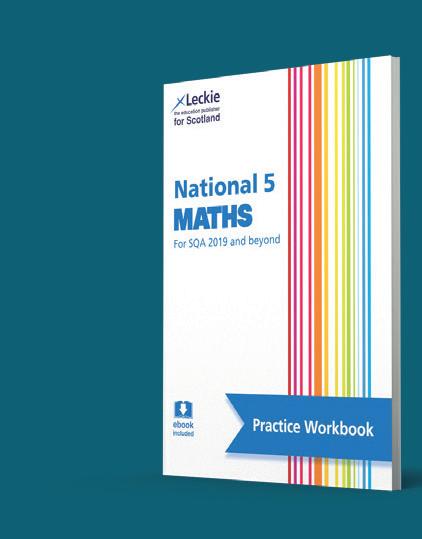
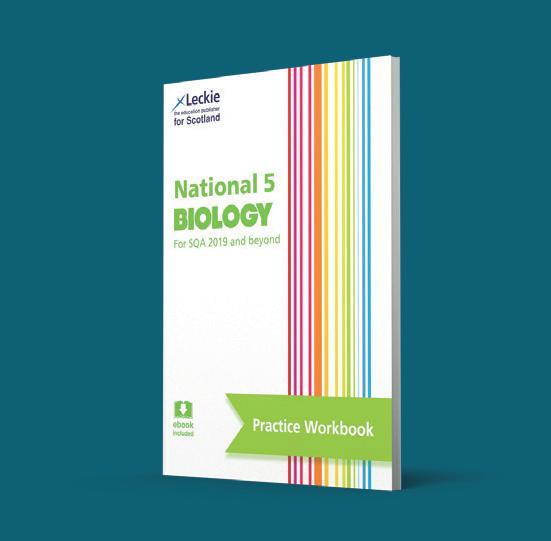

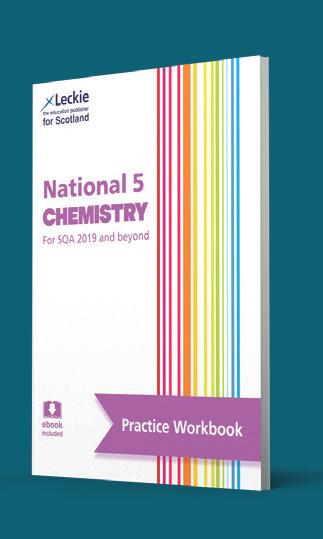

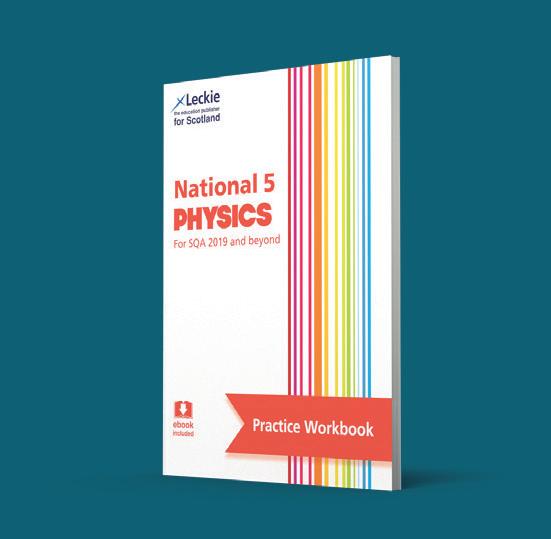

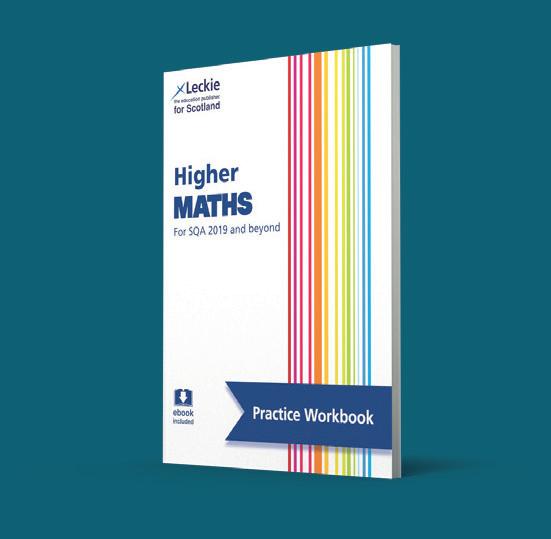


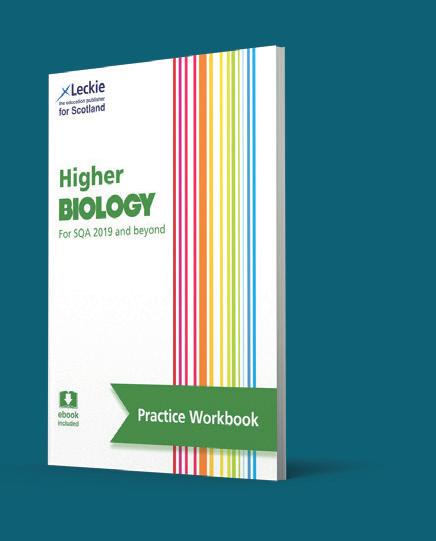

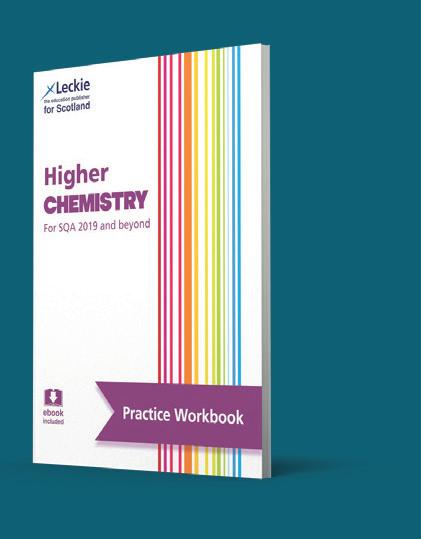

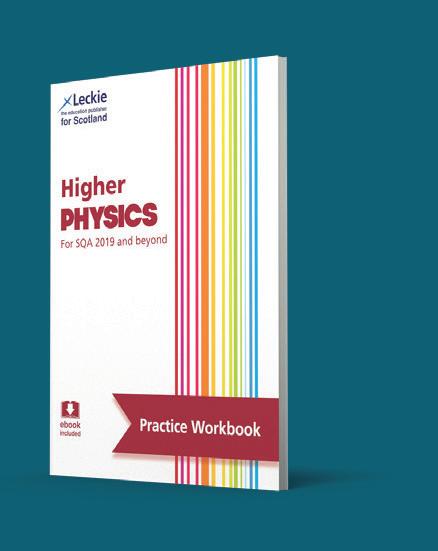

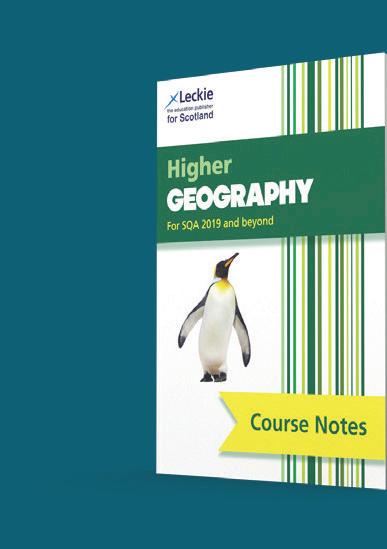
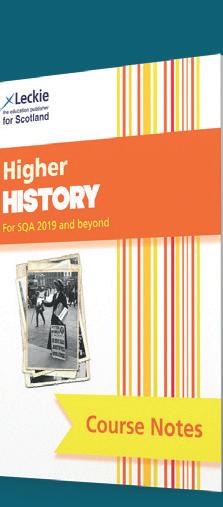




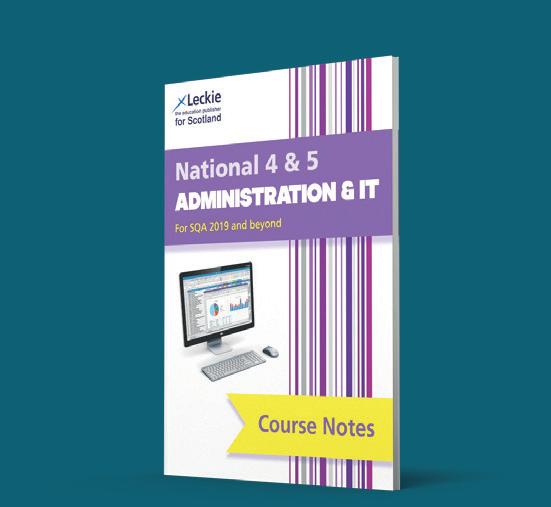




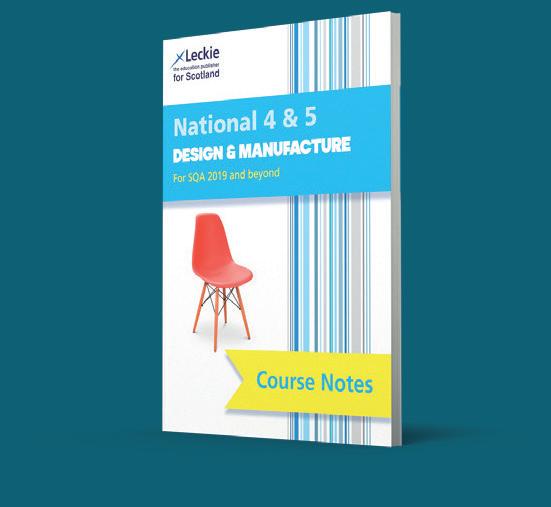









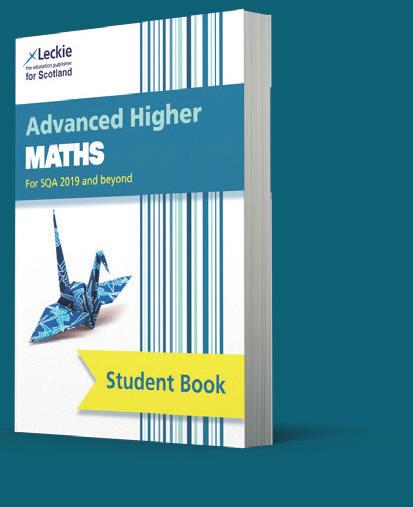







Course Notes & Student Books Comprehensive course coverage From £15.99 Practice Workbooks Practice questions on every topic and a practice exam paper £6.99 Contact your local rep to find out more: Claire (East Scotland schools): 07557 188 154 or claire.mcauley@harpercollins.co.uk Christine (West Scotland schools): 07825 116 401 or christine.stein@harpercollins.co.uk
Action on workload
The last few months have seen passion and industrial action influence change, with a historical teacher pay deal agreed to improve the treatment of teachers throughout the country. While this is a win for professionals and the industry as a whole, it doesn’t solve pressing issues that are still a ecting teachers and schools. For years now, teachers across Scotland have been subject to increasing workload, leaving many professionals overworked and
desperate for change. This was only compounded during the coronavirus pandemic, with teachers expected to go above and beyond their responsibilities to support young people.
Even after schools have returned to in-person learning full-time, the increases to workload haven’t stopped. As part of the union NASUWT’s The Big Question 2022 survey, 59 per cent of teachers said workload has increased significantly. The survey also showed that 50
www.teachersresource.co.uk 6
After a historic pay deal, the additional challenges affecting teachers in Scotland can’t be ignored: it’s time to demand action on workload
per cent of respondents do not feel managed in a way that empowers them.
These results are concerning but not shocking for Scotland’s education sta : they have been exacerbated by pressures including the current teacher workforce crisis, years of funding cuts, and the pandemic. Despite more than £200m spent on recruitment by the Scottish Government, the number of teachers in Scotland has dropped for the first time in five years, with the proportion of first-year probationers staying in the profession at a 12-year low. At the same time, the number of pupils in Scottish schools has continued to grow.
CONSEQUENCES
The huge impact that an unmanageable workload has on teachers around the country is immense, and it filters through to e ect the whole school community.
This leaves a lack of time for required professional development, adds pressure to increase working hours, and could even lead to more people leaving the profession. One of the biggest outcomes of increased workload is the detrimental impact on teachers’ mental health. More than half of survey respondents cited workload as the most important factor in causing adverse mental health. Over time, and if action isn’t taken, teaching professionals could be left burnt out or in crisis.
The negative consequences of the workload crisis will also a ect pupils, with teachers unable to give their all during lessons. Without change, the true legacy of the workload crisis will be an increased number of people leaving the profession as they are unable to cope or to do their job e ectively due to measures out with their control.
ACTION
This fight isn’t a new one: unions have been demanding action for years, influenced by their members’ experiences and concerns. This has included the EIS Time to Tackle Workload campaign, and work from NASUWT to demand action from governments and administrations across the whole of the UK.
As part of this vital work, NASUWT created their Workload Checklist, a nine-point list to empower teachers and encourage employers to demonstrate the value they place
on their sta . The list cover points like: you cannot be expected to work e ectively if your workload is excessive and unmanageable; you must have a reasonable break during the working day; you are entitled to a limit on your working hours and to a reasonable work/life balance; you should not be expected to undertake routine administrative and clerical tasks.
These are just a few of the points made through the checklist, each with further explanations and examples.
CONVERSATIONS
This checklist, alongside other tools and information from unions, can be used to start a productive conversation with school management. While their hands are often tied due to teacher shortages, sta absences and cuts to their budget, discussing how this is a ecting you, your teaching and your pupils is a positive step. In some cases, they may be able to o er suggestions or support that you haven’t accessed or been aware of before.
Remember, employers including schools are expected to follow the Scottish Negotiating Committee for Teachers Code of Practice on Collegiality (www.snct.org.uk). At school level, this means that working should be carried out within the context of the 35-hour working week. More findings from NASUWT’s survey showed that the number of hours worked in a typical mid-term week was 46, with a further 14 hours worked in a typical mid-term week outside of the school day.
The code also acknowledges the importance of having a Working Time Agreement in your school which is formed and agreed to by all sta , and of strong, e ective communications within schools.
When you approach this conversation, remember you are not alone. You could call on your school’s union reps or colleagues who are experiencing similar issues to support you if you want to approach school management over pressures surrounding workload.
If you are concerned about workload pressures in your school that haven’t been resolved internally, speak to your union.
EIS - www.eis.org.uk
NASUWT - www.nasuwt.org.uk
Scottish Secondary Teachers’ Association - www.ssta.org.uk
www.teachersresource.co.uk 7 IN THE CLASSROOM
If action isn’t taken, teaching professionals could be left burnt out or in crisis
Continued learning
Introduction to Classroom Debating
Various dates throughout 2023
youngspeakersscotland.org.uk
Creativity for Inclusion and Inclusion for Creativity
20, 27 April, 4 May
www.strath.ac.uk
The University of Strathclyde’s School of Education has a reputation for producing brilliant teachers, but the university also has a host of CPD courses available. This three-day course teaches participants relevant practical skills and techniques in music and art which can help nurture young people’s natural curiosity and creativity. After completing the course, participants will be able to support children’s voices and their desire for creativity in an inclusive learning space.
This one day course from Young Speakers Scotland introduces teachers to classroom debating, whether they are skilled in the area or complete beginners. It highlights the important role debating can play in getting pupils speaking and listening, while developing confidence and other core communication skills. Throughout the course, participants will learn how to get started; debate formats; involving the whole class; researching and structuring speeches; integrating debating into your teaching and more.
Stepping Stones
Online learning
professionallearning.education.gov.scot
Aimed at teachers in their first four years of their career, the Stepping Stones course provides support, challenge and professional learning for postprobationary teachers. The online course aims to give participants a sense of self and improve wellbeing, enabling them
to make a positive contribution to the lives of children and young people, and in the wider education system. This programme has been developed as part of a partnership between Education Scotland, Columba 1400 and the General Teaching Council Scotland.
Introduction to Dyslexia and Inclusive Practice
Online learning
www.open.edu
The Addressing Dyslexia Toolkit and Dyslexia Scotland provide three linked courses which can be completed individually or you could choose to do all of the modules. This is the first of the three courses and focuses on providing teachers and local authority sta with an awareness of what dyslexia is, its impact and how it can be supported within an inclusive school environment. After completing the module you’ll receive a digital badge and can go on to enrol in the second and third modules: Supporting Dyslexia, Inclusive Practice and Literacy; and Dyslexia: Identification and Support.
These continued professional development courses can help you advance your skills and further your teaching in the classroom
PROFESSIONAL DEVELOPMENT
8 www.teachersresource.co.uk

is brought to you by 11-16 Ideal for year old learners, all in one place. Enhance your energy teaching toolbox with free curriculum-linked resources Scan me
DATES FOR YOUR DIARY
Support pupils and plan ahead with our helpful calendar

APRIL
24
START OF SQA EXAM TIMETABLE
It’s time to support pupils as they begin the exams diet for 2023.
JUNE
END OF SQA EXAM TIMETABLE
It’s almost time for the summer holidays and the exams diet is over.
24-30
MAY DAY HOLIDAY
We’re hoping for sunshine during the first May bank holiday.
IN-SERVICE DAY
Some schools will have an in-service day to help teachers prep for the rest of the term.
BANK HOLIDAY
This May, there will be an extra bank holiday to mark the coronation of King Charles.
1 2 8 26-29
BANK HOLIDAY
MAY termdoubleAlwayscheck dates for the youcouncil live in

Some councils around Scotland will be o for the last May bank holiday weekend.
SCHOOL’S OUT FOR SUMMER
Enjoy some well-deserved time o and discover how to fill your time on page 28.
AUGUST
1 8
SQA EXAM RESULTS DAY
Today your pupils will find out how they did in their exams and if that e ects their next steps.
14-15
IN-SERVICE DAYS
Head to work and get ready to start a new school year.
16
PUPILS RETURN TO SCHOOL
The start of the school year is here, bringing new classes, pupils and opportunities.
SUPPORT
PUPIL
10
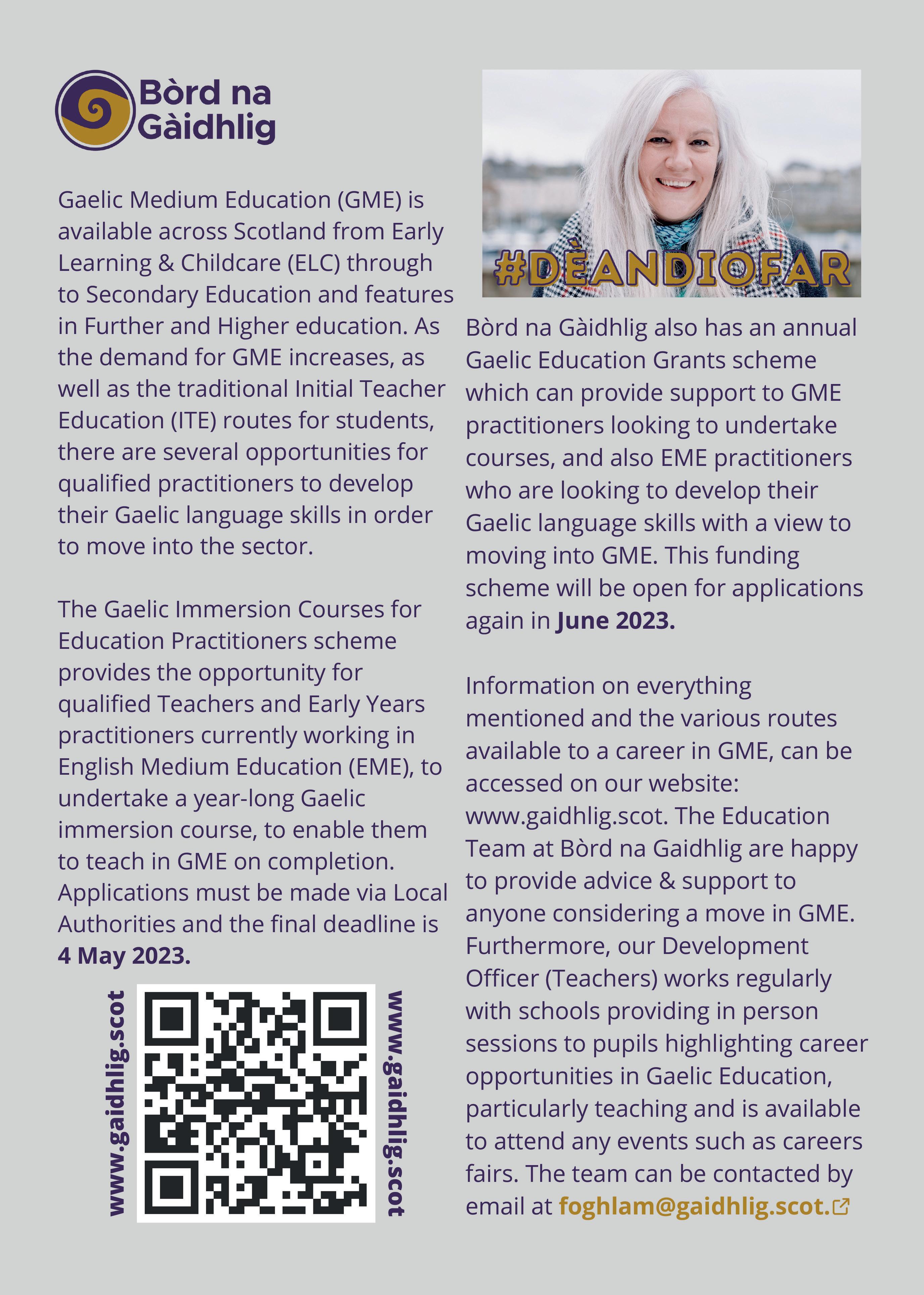
Supporting STUDENT STUDY
Exams season is almost upon us and your pupils might be nervous to get started, you can help them by offering support at every step along the way
IN THE LEAD UP
As a teacher, your pupils see you as someone who is reliable and helpful, there to support them during their school years. This can often mean pupils come to you for advice, support and reassurance as they study for their exams. Alongside offering academic support, try to answer other questions pupils have about what they can expect and where to go if they are feeling extremely stressed. This responsibility doesn’t just fall on you: there should be a wholeschool approach to support. If it hasn’t been highlighted yet, ask your department head or guidance counsellors if there is a plan in place to offer extra emotional support to pupils in the lead up to their exams. Guidance counsellors might already have this covered and will advise you when to refer a pupil to them, or what to do if a young person comes to you with concerns.

DURING EXAMS
On April 24, the SQA exams diet begins, and for some pupils, this will be the toughest thing they’ve experienced since starting school. Regardless of how much you and the wider school have prepared them, pupils will be nervous and stressed during this time. Offering encouragement and being available
to answer last minute questions or to do topic recaps can make a big difference to their exams experience. Sometimes, being told they’re capable and ready is enough to help a pupil’s nerves.
SUPPORTING YOURSELF
The exams diet isn’t just a stressful time for the young people in your school, it’s normal if you or your colleagues also feel anxious. There’s a lot of pressure on teachers during this time from pupils, school management and outside sources like parents.
Remember to look after yourself during this time, or you won’t be
able to support pupils to the best of your ability. If you are feeling nervous, chat to other teachers in your school – it’s likely that they feel the same way. Sometimes it’s easier to speak to someone anonymously than those close to you. The Education Support Partnership hotline is a great place to go for advice. Call 08000 562 561 to access support.
Looking for resources to support pupils as they prepare for their exams? Mental health charities like See Me (www.seemescotland.org) and Young Minds (www.youngminds. org.uk) have information and advice for young people.
www.teachersresource.co.uk 12
PUPIL SUPPORT
Remember to look after yourself during this time or you won’t be able to support pupils
Become a Cambridge examiner
We are welcoming Assessment Specialists who wish to become examiners across the Cambridge curriculum with our range of syllabuses in Cambridge IGCSE TM , Cambridge O Level, and Cambridge International AS & A Level.
You will gain an insight into the teaching and assessment of Cambridge qualifications, and we offer training and support with freelance opportunities which fit around your existing commitments.
For more details, just visit cambridgeinternational.org/examiners
Celebrating your impact
It’s time to applaud the impact that you have on pupils every time you step into the classroom

www.teachersresource.co.uk 14
Teachers literally make the world go round: every profession exists thanks to the education that teachers give young people at the start of their lives. Despite how important your role is to communities, you are not alone if you feel disheartened after a particularly hard three years.
Pressures of workload, increasing class sizes and more people leaving the profession has left school communities around the country in a difficult position even before the pandemic came into play, but

the last three years have brought new stresses and issues with them. The court of public opinion over pay deals, pupils who don’t always express their appreciation for what you do, a teacher staffing crisis and local authority budget cuts affecting education settings around the country may leave you questioning your role. In NASUWT’s latest The Big Question Survey, published in January 2023, 77 per cent of respondents admitted they have considered leaving their current job, and 66 per cent have considered leaving the profession entirely.
If you find yourself having these thoughts, remember why you joined the profession in the first place. Countering these challenges is the invaluable impact you have on each pupil you see on a daily basis, helping young people to form ideas, gain knowledge, and understand who they want to be in the world.
THANK YOU
We want to say thank you for everything you do, and acknowledge that teachers deserve to be celebrated every day. On 21 June 2023, people around the UK will mark National Thank a Teacher Day, but the awareness date is more than a chance for greeting card companies to make some extra money: this is a chance for others to highlight the incredible work you do, and for you to say thank you to the teachers, other education staff and supportive people around you that make your job easier or better. If you want to celebrate someone in your school, head to the day’s dedicated website and go to the schools page. Here, you can access free lesson and assembly plans, send a thank you card to members of staff, find activities to do with your pupils, and download resources to spread the word about the day in the local community.
This year, people are encouraged to celebrate the day by going back in time and using #UsThenUsNow on social media. Anyone can get involved, sharing a photo of them on their first day of school and one now, giving a mention to a member of the school community who helped shape them as a person. This could be an opportunity to share your own experiences with your pupils, to talk about a favourite teacher you had in your own school days, and to tell them why got into the profession –
some of them might even want to be teachers themselves thanks to you.
After an extremely difficult few years for teachers and the whole school community, clicking on the hashtag and reading people’s stories could also act as a pick-me-up and an important reminder of why your role is so essential to young people and their future.
IMPACT
Your impact as an educator and a positive role model will influence every pupil you teach, even if it’s just for a few hours a week over the course of a year. You might inspire their future career or help them learn something new about themselves, or yours might just be the lesson they look forward to most in a day.
This impact can support some groups more than others, like young people who face additional challenges. This could be difficulty learning or the need for additional support, or challenging factors outside of school that are impacting on their wellbeing. The cost of living crisis and the rise in the cost of heating and food, the loss of a loved one, family changes like divorce and mental health problems can all affect the way a young person is able to focus at school.
Creating a supportive, nurturing environment in the classroom can make a bigger difference for these young people. If you want to take this impact further, you could help out with extra-curriculars or your school’s breakfast club, or simply by introducing important themes into your lessons while highlighting resources young people can access for support.
Whether you feel fully appreciated in your school, or you are struggling with some of the daily challenges that come with a teaching role, remember you are changing young people’s lives every day. While they might not always express their appreciation, your impact will be long-lasting, setting them up for a positive future.
Celebrate the impact you have and the achievements of fellow teachers around you on National Thank a Teacher Day (www.thankateacher.co.uk).
www.teachersresource.co.uk 15
IN THE CLASSROOM
Discover more ways to make an impact within the school community on page 21
Road Safety Learning within Curriculum for Excellence (CfE)





Despite the good progress made over the years, the road environment still represents one of the highest causes of accidental death to Scotland’s young people. It is important, therefore, to maintain the excellent road safety support that already exists in schools and communities.

Road Safety Scotland have developed two free road safety learning resources specifically for secondary school pupils, and linked to CfE. Both online resources aim to engage young people in developing road skills to promote good peer influence, and provide strategies to help them to look after themselves and others in the road environment.

Your Call (S1-S3) targets that ‘at risk’ age group with a range of interactive activities which explore risk-taking, decision making, personal safety, pre-driver attitudes and peer pressure. It embraces a learning style that is fundamental to CfE and provides teachers with flexible lesson plans that support the experiences and outcomes. Pupils are actively encouraged to discuss and share experiences, reflect and challenge their own behaviour, with a view to taking responsibility for their own safety and that of others. The resource focuses on relevant issues for the 11-14 age group, including two feature films which explore the impact a road accident can have on young lives –one from a pedestrian perspective for younger pupils and, for older pupils, with a passenger theme. It has mobile compatibility and can be used by both teachers and students using a tablet or mobile phone.
Crash Magnets (S4-S6) is aimed to help shape young people’s opinions and attitudes to issues such as speeding, drink driving, driver distraction, drug driving and in-car safety. The online activities are combined with DVD clips of other young people sharing experiences, with the aim being to encourage students to feel confident about expressing themselves in class about their own opinions and experiences. It seeks to engage them in the importance of positive attitudes and behaviours before they get behind the wheel of a car. The resource acknowledges that, at their age, driving a car has great benefits in developing independence and for some, defines them as an adult. However, this must be balanced with an understanding of the dangers of behaving irresponsibly at the wheel. Although activities are geared towards certain year groups, they are not prescriptive and allow for flexibility.

You can find out more about these resources at www.roadsafety.scot/children-and-educators/

FOCUS ON:
Pupil behaviour
Creating a safe and respectful environment in the classroom can make conversations about behaviour more positive, and open the door for pupils to tell you how they are feeling
SAFE ENVIRONMENT
Creating an environment where pupils feel safe, respected and like they have someone they can trust is an important part of starting positive conversations around behaviour. While this should surpass your own classroom walls and be a whole-school approach, it can start small as you build these valuable relationships with your own pupils. By teaching them new things in a supportive way, you already have the foundations to build on.
This doesn’t have to start with conversations about behaviour, you could ask how they feel about different topics you are discussing, or how they worked out their answers to a question, exemplifying that you are listening to what they have to say. Creating an environment where its ok to speak up about what you’re struggling with will make pupils more likely to listen and act when you approach them about disruptive or negative behaviour.
LEARNING METHODS
If you have particular pupils who continually disrupt lessons and the learning of others, take a step back and consider why they are doing this consistently. They could be struggling to take in information in the way it is presented, or having difficulty understanding the work.
Switching up the teaching method you use for different topics will engage pupils in a different way, and will benefit even the most studious of young people. Instead of asking for answers from individual pupils on a topic, you could open up a debate, allowing your
young people to give their point of view or to bounce ideas off of their peers. You could also use visual aids to explain particular topics paired with the written information you would normally use for lessons.
If you are unsure on how to adapt lessons or learning styles to ensure all of your pupils can thrive, speak to your school’s additional support team. With a wealth of experience in this area, they could have tips and advice to transform behaviour in the classroom.
BULLYING BEHAVIOUR
Because you only see every pupil for a short time each week, it can be hard to spot bullying behaviour going on between young people. While this is the case, you should trust your judgement if something

is going on or you notice changes in different individuals. Having consistent discussions about bullying in the classroom can help young people to recognise how they are treating others, and that support is there when they need it.
CONVERSATIONS
Whether the behaviour you are speaking about is something small and one-off or has become a big issue in the classroom over time, these conversations should be approached in a professional but sensitive way. If you are concerned about a pupil’s reaction, or you would like extra support, speak to the guidance team at your school or your department head and have them sit in on any meetings with this pupil, their parents or guardians.
For further advice and resources around pupil behaviour and how to start a conversation, speak to RespectMe (www.respectme.org.uk) and Children in Scotland (www.childreninscotland.org.uk).
IN THE CLASSROOM
17 www.teachersresource.co.uk
A LITTLE SUPPORT for a big difference
Discover the project making a difference in schools with a funding pot to offer support

In 2022, the team at Twinklproviders of teaching and highquality learning materials - were inspired to make a difference in the communities they work with, helping schools to kick start their projects. The Twinkl Prize Draw and Community Collection was launched in September: a funding pot where one lucky applicant receives a cash injection to help their school.
“We spent a lot of the last year trying to figure out how this would work and how we could support educators with something that was really accessible,” highlights Hannah Corrigan, the Community Collection manager at Twinkl.
The first round opened in September 2022 and the applications came flooding in, but the requests exceeded the team’s expectations.
www.teachersresource.co.uk 18
PIC: ©TWINKL / RHU PRIMARY SCHOOL
We realised that actually, we needed and wanted to do more than award one winner
RESPONSE
“We were pretty blown away with the response and the need, we originally thought it was this lovely thing where we would support a single school or one applicant each time,” reveals Hannah.
The winner would receive £500 towards the project they wanted to launch, helping to create new opportunities for young people. The first round of applications revealed the true scope of need, along with the passion of educators around the UK.
“We had so many more applications than we expected and the need was very different than we initially thought,” explains Hannah. “We had schools asking for community support because they needed to set up a warm room for families, we’ve had schools asking for help to buy washing machines because people in their community don’t always have them at home, schools asking for help with breakfast clubs.
“We realised that actually, we needed and wanted to do more than award one winner with £500.”
During this first round, the team made the decision to offer more support, whilst still giving one school this funding.
MEANINGFUL
Since Twinkl received the first cohort of applications, they have been able to give support to 193 applicants, and the impact has been incredibly meaningful.
“A lot of schools are asking for support

with their library and reading whether they need more books or one school wanted their books to better reflect the diversity in their community, so we have sent boxes of books and money towards those,” remembers Hannah. “One school wanted to teach their pupils about growing and so we sent them a box of seeds to get started with a school garden, we sent another school Lego and board games for their after-school club.
“Others have received food vouchers and supermarket vouchers to help breakfast clubs, and support with the running of things like washing machines.”
The effect that the Community Collection is having is wide-ranging, and this support isn’t just to help young people, but also to celebrate education staff.
“These applications have been really indicative of how passionate educators are, not just in helping their school, but really everyone across their community,” emphasises Hannah. “We had one school say their staff room is really plain and they wanted their staff to feel really valued, so we sent them a bundle of goodies for the staff room.
“It’s not just necessarily about the school setting up a project, sometimes its recognising that these teachers are working so hard and showing them it’s appreciated.”
The fund helps cut through the metaphorical red tape that often surrounds other applications and simplifies the process, making a
difference to school communities quickly.
APPLY
“Funding is often a bit of a maze, trying to figure out the right wording and what information you need to fill in big forms,” offers Hannah. “We’ve made it as simple as we can and the form takes about 15 minutes to complete.”
The next round of the Community Collection is open for applications on 24 April 2023 for two weeks, but Twinkl have already planned for it to open every half term this year and people can apply as many times as they want to.
“All we are asking for is the applicant’s name, their school, address and contact information, and then there’s a box where they can type 100 words about what they would spend the money on and the impact it will have on the school,” says Hannah. “It’s really open, educators from pre-school through to secondary school and special education settings can apply. We’re keen to encourage anyone to apply –those working in educational settings, community groups and more.”
In just 15 minutes, your school and the young people you teach could be in the running for essential funding to add more opportunities to your school community, or to brighten the day of the fellow educators around you.
Find out everything you need to know to apply at www.twinkl.co.uk/ communitycollection or email communitycollection@twinkl.co.uk
www.teachersresource.co.uk 19 SHOWCASE























































DUNDEE REP THEATRE BOOK NOW AT DUNDEEREP.CO.UK 01382 223 530 TUE 13SAT 17 JUN Dundee Rep and Scottish Dance Theatre Limited is a Registered Charity No: SC021201 Scottish Charity Registered No: SC017315 Charity No. SCO37984 Big DoG WOOF WOOf! Schools Tour ................. ........... . . ............................. ................. . . ......................... . . . . . . . . . . ........... Subscribe to the mailing list for news about the Big DoG Schools Tour, our travelling festival for Dumfries and Galloway schools ........... . ......... . ............................ ......... . . . . ........... 22 september - 1 october 2023 BOOK FESTI V AL WIGTOWN wigtownbookfestival.com A 10-DAY CELEBRATION of stories in Scotland’s National Book Town with programmes for children, young people and adults
Time to give back
As summer approaches followed by a new school year, you could use your skills to improve the lives of your pupils and people in your local community
Your well-deserved time off is getting closer and when the summer holidays arrive, you will have the chance to relax, de-stress or maybe go on a holiday. Once you have been able to de-compress and spend time with your friends and family, you might be searching for other ways to fill your summer break, helping you to keep to a routine or to benefit those around you.
There are plenty of opportunities to get involved within the community, or you might want to give back to the people in your school when you return to the classroom in August. Remember, only give the
time that you can afford to without compromising your mental, physical and financial health.
FOR THE SUMMER
As the cost of living crisis continues to affect families all over the country, skilled volunteers are more in demand than ever before, and in all areas of society. Between 1 April and 30 September 2022, the Trussell Trust gave out more than 116,370 emergency food parcels in Scotland alone.
There are opportunities across the country in community foodbanks, warm banks, with people experiencing homelessness, and in supporting the wellbeing of others. You could also

help by volunteering or fundraising for a local charity or organisation who need extra support during this time to ensure they can continue to help the local community. Asking people you know from local organisations is a great place to start, or you can search for opportunities online using tools like Volunteer Scotland (www.volunteerscotland. net) and Volunteering Matters (www. volunteeringmatters.org.uk).
At a time of global turmoil, Scotland is a safe haven for many refugees. Organisations like Refuweegee in Glasgow (www.refuweegee.co.uk) and the Scottish Refugee Council (www.scottishrefugeecouncil.org.uk)
www.teachersresource.co.uk 21
AFTER HOURS
need people to volunteer their time in order to continue providing support. You could dedicate your time specifically to helping young people affected by things like the cost of living crisis. Initiatives like Club 365 in North Lanarkshire and Glasgow City Council’s Children’s Holiday Food Programme help children and young people access free, nutritious meals during the school holidays.
Volunteering opportunities stretch further than these current issues: you could combine them with your interests, too. The National Trust for Scotland (www.nts.org.uk) is always recruiting volunteers to protect Scotland’s heritage, or if you have a love of animals, you could volunteer with the Scottish SPCA (www. scottishspca.org).

As a teacher, you already have the skills and disclosure checks necessary to get involved with young people’s
groups outside of the school. You could become involved with your local Girlguiding (www.girlguiding.org.uk) or Scouts (www.scouts.org.uk) group, or check if there are any summer programmes who need volunteers in your area.
AT YOUR SCHOOL
Your return to school in August is a chance to support pupils outside of the classroom by getting involved with other projects in the school community. This could be as simple as setting up an after-school study session once a week, or you could dedicate time each day to helping with your school’s breakfast club if you want to better connect with pupils before the school day begins.
Like clubs in the community, getting involved with extra-curriculars is a great way to combine your interests with giving back to the young people around you. You could help to coach an existing club or speak to school management about launching a new one that suits your availability and skillset. This is a great way to give pupils more free opportunities to get active and learn, but it also gives you the chance to get to know them and how they learn better, in turn helping in the classroom.
Volunteering within your school community doesn’t have to be regular:
you could offer your time during the busier periods of year when pupils require extra support, like during exams, over the festive season or during periods of staff absence.
IN THE CLASSROOM
Armed with your own experiences of volunteering, you can highlight how beneficial this can be for pupils. Young people always need more ways to improve their personal statement or CV, and giving back is a great way for them to gain experience, learn new skills, and to network with people in the community.
You could build this into a lesson plan, or simply suggest different resources to young people and explain why volunteering could help them in their future. Organisations like YouthLink Scotland (www.youthlinkscotland. org) and Youth Employment UK (www. youthemployment.org.uk) showcase opportunities suited to young people and can also offer guidance on why they should spend time volunteering.
Discover more volunteering opportunities with the NHS (www.careers.nhs.scot), in Scotland’s museums (www.nms.ac.uk) and in conservation (www.historicenvironment.scot).
www.teachersresource.co.uk 22
AFTER HOURS
Getting involved with extra-curriculars is a great way to combine your interests with giving back
90kg Rice


Challenge
Can
your school sell 90 bags of rice and change a life?




Challenge Pack wh you need for a term
Challenge Pack wh you need for a term
THE 90KG RICE CHALLE TRADE SC
WWW.JTS.CO.UK

WWW.JTS.CO.UK/90KGRICECHALLENGE
EMAIL: NICOLA@JTS.CO.UK
EMA
Challenge
90kg Rice
HE ISSUE
nly 1 in 3 children can afford to go to secondary hool in Malawi so many have no choice but to go ork in the fields. Education is one of the most fective ways to escape poverty THE 90KG RICE CHALLE TRADE SC F a i r T r a d e C l i m a t e J u s t i c e S o c i a l E n t e r p r i s e
PHONE: 0141 255 0901
THE ISSUE
Only 1 in 3 children can afford to go to secondary school in Malawi so many have no choice but to go work in the fields. Education is one of the most effective ways to escape poverty.
BEING MINDFUL OF YOUR
Mental health
With so much of your time and e orts focused on supporting the young people you teach, it can be hard to take a step back and consider how the pressures of your work, and of everyday life, are a ecting your stress levels and overall mental health.
HEALTH VS WELLBEING
A key component in processing how you feel, finding coping mechanisms and, when necessary, seeking support, is understanding whether you are experiencing a mental health problem or your overall mental wellbeing is a ected. The two terms are often used inter-changeably, but they have di erent meanings.
Your mental wellbeing comes from your sense of self and your ability to live how you would like to, while mental health is defined by specific signs and symptoms that cause significant emotional distress. The persistent presence of these symptoms could then constitute a mental health problem.
Having long periods of low mental wellbeing could mean you are more likely to develop a mental health problem, while if you already have a mental health problem, you’re
more likely to have periods of low mental wellbeing. The two are intrinsically linked, and looking after one benefits the other.
STRESS
As a teacher, you are responsible for shaping the minds of the future, but with that power comes a lot of pressure, and it is normal to feel concerned or stressed from time to time. When this stress becomes a weekly or daily occurrence, it is important to address it. In the Teacher Wellbeing Survey 2022, union NASUWT found that workload remains the main factor contributing to work-related stress for teachers, with 90 per cent of respondents having experienced more work-related stress in the last 12 months. This increase in stress had a concerning impact on teachers lives, with respondents citing an increase in anxiousness, a loss of sleep, increased use of alcohol and prescription drugs, and the breakdown of relationships.
It is essential to seek support before stress reaches this level, or if it already
has. Without support, this could lead to burnout or presenteeism, the act of continuing to work while sick without being able to perform at your best. Mental health charities like Mind (www.mind.org.uk), the Mental Health Foundation (www.mentalhealth.org. uk) and Mental Health At Work (www. mentalhealthatwork.org.uk) can all provide information and links to support.
If you are concerned about your mental health or work-related stress, call the Education Support Helpline available 24 hours a day on 08000 562 561 or talk to the Samaritans (www.samaritans.org) on 116 123.
AFTER HOURS
It is essential to seek support before stress reaches this level, or if it already has
24 www.teachersresource.co.uk
Reflecting on how you are feeling and how your work is affecting your mental health and wellbeing can help you thrive and be happy in the long run
Widening Participation in Veterinary Medicine at the UNIVERSITY OF EDINBURGH

The widening participation agenda in higher education has been in place for decades. Widening participation aims to address discrepancies in the take-up of higher education opportunities between different under-represented groups of students.
Students from disadvantaged backgrounds, lower income households and other under-represented groups may face many barriers to entry to higher education. Widening participation schemes attempt to remove these barriers and improve access to education, progress within higher education and to improve graduate outcomes and employability.
THE TEAM
Our team at the University of Edinburgh’s Royal (Dick) School of Veterinary Studies combines passion, creativity and innovation, to inspire young minds and maximise their potential through unique opportunities both in school and on campus. Our work spans many geographical reaches, supporting young people and their parents/carers to make
informed decisions on a local, regional and national level.
OUR EVENTS
We run a wide range of events and activities for young people aged between 9 and 19, targeted at state school educated students, students who would be the first in their family to attend university, students from low socioeconomic backgrounds and students who come from neighbourhoods where there is low progression to higher education.
OUR PROGRAMMES
Our programmes ensure that prospective vet students are well prepared for their transition to university. Participants gain an understanding of career pathways,
experiences of university learning and teaching, support with every aspect of the application process and advice from staff and students on becoming a vet.
FURTHER INFORMATION
For further information on widening participation programmes at the University of Edinburgh, visit our website: www.ed.ac.uk/student-recruitment/ widening-participation/projects
To discuss how your school can work with us to help students access higher education, please contact our admissions team by email vetug@ed.ac.uk
Your MONEY MANAGEMENT
BUILDING A BUDGET
The first step to getting in control of your money is understanding it. It can feel like an overwhelming area to tackle, but taking control is simpler than you think.
The best place to start is creating a budget that works for you and your life: this doesn’t just help you see if you could make savings or to identify old subscriptions that could be cancelled to keep money in your pocket, it gives you personal financial management skills.
There are free tools to help you do this, like the Budget Planner from MoneyHelper (www.moneyhelper.org. uk). This lets you input your earnings and what you usually spend, then gives you a breakdown of your finances by category with personalised tips on how you could save. The best part is you can save this in an online account to revisit and tweak as you need to.
DAILY SAVINGS
Council tax, the cost of energy and the price of other essentials has gone up in recent months, but in your dayto-day life, there could be ways your profession helps you save.
There are discount schemes available to education sta as a way to say thank you for the way teachers benefit society. Discounts for Teachers (www.discountsforteachers.co.uk) and Teacher Perks (www.teacherperks. co.uk) are free to join, o ering discounts on everything from food shopping to gym memberships. By utilising these services, you could save money on the things you regularly spend on.
Alongside schemes dedicated to teachers, there are other ways to save or to earn cashback. By using Airtime Rewards (www.airtimerewards.co.uk) you can earn cashback to redeem against your phone bill, and all you have to do is add your cards to the
account to start saving. Quidco (www.quidco.com) pays out the highest cashback rates in the UK, while Top Cashback (www.topcashback.co.uk) also o ers vouchers and deals.
FINANCIAL HEALTH CHECK
Could you be saving money on the bills and subscriptions that already come out of your bank account every month? The Bank of England expects the UK’s inflation rate to fall to around four per cent by the end of 2023, bringing it closer to the two per cent target. This means that the price of goods and services will stop rising as quickly, but they could stay higher until that happens.
As the nation waits for the cost of everyday items to become more stable, looking for ways to save can help you, even if it’s just a little bit at a time. Taking time to review the deal you have on your car, home or life insurance using services like Money Supermarket (www.moneysupermarket.com) or advice from Money Saving Expert (www.moneysavingexpert.com) is quick and easy, but could see you make a big saving. Money Saving Expert also have a free, weekly newsletter filled with tips and deals to help people save.
If you are concerned about the cost of living crisis or problem debt, contact a charity like StepChange (www.stepchange.org) or contact Citizens Advice (www.citizensadvice.org.uk).
Ge ing in control of your finances can give you understanding and help you find ways to save alongside dedicated schemes to support teachers and other education staff
AFTER HOURS
26 www.teachersresource.co.uk







Room Could you give a child the love, care and stability they desperately need? Become an Action for Children foster carer and we’ll support you every step of the way. Get in touch 0141 222 1770 Fostercare.caps@actionforchildren.org.uk actionforchildren.org.uk/fostering Registered charity nos. 1097940/SC038092. Company no. 04764232. © Action for Children 2021. 1716. for more? 1716 Gala life Oct advert.indd 1 06/10/2021 14:51 Can you help change a child’s life in Scotland? More foster carers from all backgrounds are needed in Scotland to ensure the best match is available when young people need a loving family www.barnardos.org.uk/foster 0800 0277 280 0141 227 2390 scotwest.co.uk *This includes: Argyll & Bute, East Ayrshire, East Dunbartonshire, East Renfrewshire, Glasgow, Inverclyde, North Ayrshire, North Lanarkshire, Renfrewshire, South Ayrshire, South Lanarkshire and West Dunbartonshire. Scotwest Credit Union is a member-owned not for profit offering fair and ethical finance available to anyone living or working in the west of Scotland*, Dumfries & Galloway, Perth & Kinross, Stirling or Highlands. Authorised by the Prudential Regulation Authority and regulated by the Financial Conduct Authority and the Prudential Regulation Authority (FRN 213616) Scotwest.members @ScotwestCU A financial friend whether you spend a little or save a lot
Preparing for Summer
Your chance to relax is almost here. Discover our top suggestions of how to spend your summer holidays


In just a few months, you’ll get the well-deserved chance to put your feet up, de-stress and spend time doing what you enjoy most without the pressures of lesson planning, marking and time in the classroom.
Six weeks might seem like a long time, but without good planning, it could pass by in a flash. Avoid the dreaded feeling that you’ve wasted your free time and start planning what you want to do this summer as soon as you can. We’ve made it simple to discover di erent ways to have a jam-packed summer.
If you have already thought about a holiday you want to go on, a new hobby to pick up or who you want to go and see throughout the summer, you might still have time to try something new in between your plans.




ON THE ROAD
If you’re looking for a flexible way to experience new places around the UK, it’s time to hop in your car and set o for one of the country’s well-known road trip routes. Find out what rural Scotland has to o er as you tackle the North Coast 500, or the route’s smaller companion, the North Coast 250. The longer route takes around five to seven days to complete, allowing you to make multiple stops along the way. Following the coast in a loop beginning and ending in Inverness,



GO SOLO
Fancy a solo escape from reality this summer? Travelling alone is no longer the daunting experience it once was, but always keep your safety in mind. Signing up for a trip where you get the chance to meet other solo travellers is a great way to ensure you have a safe but exciting holiday, and it comes with the added
you’ll see beautiful scenery, have the opportunity to try some of Scotland’s best food and drink, and there’s plenty of places to camp or book in for the night. For those who have completed the journey before or want to go further afield, try something di erent and head across the border to England, taking a journey through the Lake District National Park. You could spend a few days in the Lakes or even a whole week depending on what you want to see.
bonus of making some new friends along the way. Provider Solos Holidays (www. solosholidays.co.uk) has trips to more than 60 countries around the world. When you arrive, you’ll meet your tour leader who will show you the best sites in each destination, so you don’t have to do all of the planning before you set o .
www.teachersresource.co.uk 28
SCHEDULE SOME SUN
We’re keeping our fingers crossed for a hot Scottish summer this year, but if you want guaranteed sunshine, this is your chance to book a summer getaway. Find something that suits your budget by using a dedicated company that does most of the planning for you. Companies like TravelPlanners (www.travelplanners.co.uk) and
QUALITY TIME
Regardless of what you plan this summer, remember to set some time aside to see your loved ones. If you have children who will be o during the summer holidays, there’s plenty of ways to include them in plans or to keep them entertained at home. Both Visit Scotland (www.visitscotland.com)

Trailfinders (www.trailfinders.com) are great places to start. If you want to book a trip yourself, don’t forget to take advantage of all of your options. Through discount schemes like Discounts For Teachers (www. discountsforteachers.co.uk) you could receive money o whole trips or hotels, or receive cashback once you pay in full.
BUILD YOUR SKILLS
and National Trust for Scotland (www.nts.org.uk) have lists of inspiration, with places to visit and activities to do with children in the warmer months. If you’re planning a summer holiday with the whole family, search for deals where kids go free so you don’t end up paying above the odds.
If you don’t have any plans for the summer and want to spend your time upskilling, you could learn something new while you get some sun, returning to school newly inspired come August. There are companies dedicated to holidays that also see you build new skills. Oyster Worldwide (www.oysterworldwide. com) are an adult gap break and responsible travel provider that operate in 17 countries around the world. The company prides itself on o ering quality, ethical experiences that last anywhere from two weeks long to a whole year. Using their search tool, you can tailor your planning to how long you want to go, where, and what type of project you want to work with. Head
AFTER HOURS
29 www.teachersresource.co.uk
to page 21 to discover volunteering opportunities to fill your summer break
Need some travel inspiration? These teachers turned travel influencers should be your first stop: Alex Zouaghi - Instagram: @a_ontheroad Laurie Alyce Matthews - TikTok: @lauriealyceadventures
Embracing
WELLBEING
It can be hard to switch o from the stresses of the classroom, but without doing so, you could experience burnout, a ecting your overall physical and mental health. Warmer weather and longer daylight hours are the perfect reason to start something new, helping you to de-stress and unwind.
WELLNESS
Wellness has become a buzzword in recent years, but there’s a reason why these popular practices are constantly talked about. Activities like meditation, journaling and yoga can be of great benefit to your mental health, in turn improving your sleep and how you feel on a daily basis.
Adding these practices into your routine doesn’t have to cost money, all you need is a blank notepad or the notes app on your phone, and a space in your home where you can stretch or sit.
Meditation can be as simple as practicing deep breathing, or you could
use a guided mediation from YouTube (www.youtube.com), or a dedicated app like Headspace (www.headspace.com) or Calm (www.calm.com). YouTube is also a great resource for free yoga classes, with creators like Yoga with Adriene and Yoga with Kassandra providing a range of options depending on your abilities, what you want to achieve and how much time you have available.
Journaling is a great way to decompress after a long day, or to appreciate the positive things that have happened. You could use this as a chance to get your thoughts on paper and decipher them, or to bullet point happy moments or things you enjoyed at the end of the day.
MAKING THE SWITCH
It is thought that doomscrolling –endlessly scrolling through social media on your phone – is bad for mental health, causing anxiety and disrupting sleep. It can also waste your time,
leaving you to procrastinate instead of completing tasks. Finding new ways to fill this time can help break the habit, all while helping you relax and unwind.
You could get stuck into a popular summer read – we love Daisy Jones and the Six by Taylor Jenkins Reid which has recently been adapted into a series – or even start a new tv show or podcast. Picking a podcast depends on what you want to achieve: do you want to learn something new, find a new way to digest the news, or just switch o from reality? Using the charts and categories on providers like Apple Podcasts (podcasts.apple.com), Spotify (open.spotify.com) and Google Podcasts (podcasts.google.com) can help you find the perfect fit.
A great way to stick to a new habit is starting it with friends. You could start a book club or a weekly catch up to discuss a new podcast episode or show.
www.teachersresource.co.uk 30
With longer days and be er weather, the spring and summer are the perfect months to unwind by trying something new
AFTER HOURS
the Twinkl Teacher Wellbeing Toolkit Resource Pack at www.twinkl.co.uk
Discover
Lesson plans School talks



Looking for ways to teach your students about money and the economy? Our free teaching resources are designed to help students: • understand more about the economy • learn how to manage their money • explore jobs in the financial sector Scan me Visit bankofengland.co.uk/education for more details or scan the QR code.
Money and Me P1 to P5 An introduction to money and how to manage it. EconoME S4 to S5 Learn more about the economy and develop skills to make informed decisions about money. S1 to S6 Book a speaker from the Bank of England to talk to your students about the economy, what we do, and career opportunities at the Bank.
























































































































































